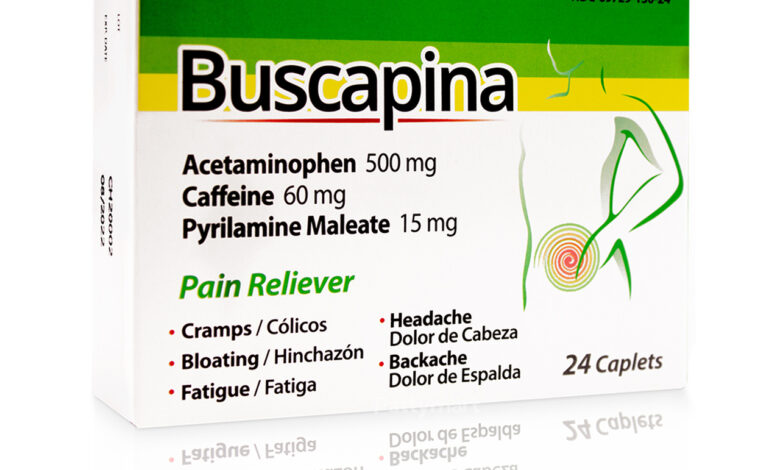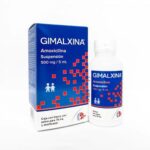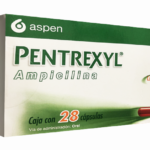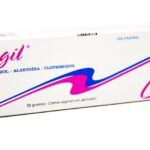Buscapina: Uses, Dosage, Side Effects, Interactions

What is Buscapina?
Buscapina is a fast acting pain reliever containing Acetaminophen 500 mg, Caffeine 60mg, and Pyrilamine Maleate 15 mg. These ingredients provide quick temporal relief for menstrual cramps, bloating, fatigue, common cold symptoms, backache, headache, water-weight gain and more. Do not exceed recommended dosage.
Acetaminophen: Although not fully elucidated, the analgesic effects are believed to be due to activation of descending serotonergic inhibitory pathways in the CNS. Interactions with other nociceptive systems may be involved as well (Smith 2009). Antipyresis is produced from inhibition of the hypothalamic heat-regulating center.
Caffeine: A cranial vasoconstrictor to enhance the vasoconstrictor effect. It is also used as a central stimulant for relief of headache.
Pyrilamine: H1-receptor antagonist. It is a first generation antihistamine. However, it rapidly permeates the brain and so often causes drowsiness as a side effect.
How should Buscapina be taken?
Always refer to the actual package for the most accurate information. Adults and children 12 years and over: take 2 caplets with water. Repeat every 6 hours as needed, do not exceed 6 caplets. If a skin or general allergic reaction occurs, stop use and seek medical help right away.
What are the side effects of Buscapina?
Buscapina causes side effects, as a result when using this product;
- you may get drowsy
- avoid alcoholic drinks
- excitability may occur, especially in children
- alcohol, sedatives, and tranquilizers may increase drowsiness
- be careful when driving a motor vehicle or operating machinery
- limit the use of caffeine-containing medications, foods or beverages because too much caffeine may cause nervousness, irritability, sleeplessness, and occasionally rapid heartbeat. The recommended dose of this product contains about as much caffeine as a cup of coffee.
Interaction and Safety information
Abametapir: May increase the serum concentration of CYP1A2 Substrates (High risk with Inhibitors). Avoid combination
Acebrophylline: May enhance the stimulatory effect of CNS Stimulants. Avoid combination
Adenosine: Caffeine and Caffeine Containing Products may diminish the therapeutic effect of Adenosine. Management: Monitor for decreased effect of adenosine if patient is receiving caffeine; significantly higher adenosine doses or alternative agents may be required. Discontinue caffeine 24 hours in advance of scheduled diagnostic use of adenosine if possible. Consider therapy modification
Alcohol (Ethyl): May enhance the hepatotoxic effect of Acetaminophen. Monitor therapy
Amifampridine: Agents With Seizure Threshold Lowering Potential may enhance the neuroexcitatory and/or seizure-potentiating effect of Amifampridine. Monitor therapy
AtoMOXetine: May enhance the hypertensive effect of Sympathomimetics. AtoMOXetine may enhance the tachycardic effect of Sympathomimetics. Monitor therapy
Barbiturates: May increase the metabolism of Acetaminophen. This may 1) diminish the effect of acetaminophen; and 2) increase the risk of liver damage. Monitor therapy
https://4caa2cbdec33fc0ab51cca1a96822eb0.safeframe.googlesyndication.com/safeframe/1-0-38/html/container.html Broccoli: May decrease the serum concentration of CYP1A2 Substrates (High risk with Inducers). Monitor therapy
Bromperidol: Caffeine and Caffeine Containing Products may decrease the absorption of Bromperidol. Monitor therapy
BuPROPion: May enhance the neuroexcitatory and/or seizure-potentiating effect of Agents With Seizure Threshold Lowering Potential. Monitor therapy
Busulfan: Acetaminophen may increase the serum concentration of Busulfan. Monitor therapy
Cannabinoid-Containing Products: May enhance the tachycardic effect of Sympathomimetics. Monitor therapy
Cannabis: May decrease the serum concentration of CYP1A2 Substrates (High risk with Inducers). Monitor therapy
CarBAMazepine: May increase the metabolism of Acetaminophen. This may 1) diminish the effect of acetaminophen; and 2) increase the risk of liver damage. Monitor therapy
CloZAPine: CYP1A2 Inhibitors (Weak) may increase the serum concentration of CloZAPine. Monitor therapy
Cocaine (Topical): May enhance the hypertensive effect of Sympathomimetics. Management: Consider alternatives to use of this combination when possible. Monitor closely for substantially increased blood pressure or heart rate and for any evidence of myocardial ischemia with concurrent use. Consider therapy modification
CYP1A2 Inducers (Moderate): May decrease the serum concentration of Caffeine and Caffeine Containing Products. Monitor therapy
CYP1A2 Inhibitors (Moderate): May increase the serum concentration of Caffeine and Caffeine Containing Products. Monitor therapy
CYP1A2 Inhibitors (Strong): May increase the serum concentration of Caffeine and Caffeine Containing Products. Monitor therapy
Dapsone (Topical): May enhance the adverse/toxic effect of Methemoglobinemia Associated Agents. Monitor therapy
Dasatinib: Acetaminophen may enhance the hepatotoxic effect of Dasatinib. Dasatinib may increase the serum concentration of Acetaminophen. Management: Avoid coadministration of acetaminophen and dasatinib if possible. If coadministration is unavoidable, monitor for signs/symptoms of hepatotoxicity, particularly in patients with greater acetaminophen exposure. Consider therapy modification
Doxofylline: Caffeine and Caffeine Containing Products may enhance the adverse/toxic effect of Doxofylline. Avoid combination
Esketamine: May enhance the hypertensive effect of CNS Stimulants. Monitor therapy
Flucloxacillin: May enhance the adverse/toxic effect of Acetaminophen. Specifically, the risk for high anion gap metabolic acidosis may be increased. Monitor therapy
Formoterol: Caffeine and Caffeine Containing Products may enhance the adverse/toxic effect of Formoterol. Caffeine and Caffeine Containing Products may enhance the hypokalemic effect of Formoterol. Monitor therapy
Fosphenytoin-Phenytoin: May decrease the serum concentration of Acetaminophen. Specifically, serum concentrations of acetaminophen may be decreased (leading to decreased efficacy), but the formation of the toxic N-acetyl-p-benzoquinone imine (NAPQI) metabolite may be increased (leading to increased hepatotoxicity). Monitor therapy
Guanethidine: May enhance the arrhythmogenic effect of Sympathomimetics. Guanethidine may enhance the hypertensive effect of Sympathomimetics. Monitor therapy
Imatinib: Acetaminophen may enhance the hepatotoxic effect of Imatinib. Monitor therapy
Indacaterol: Caffeine and Caffeine Containing Products may enhance the adverse/toxic effect of Indacaterol. Caffeine and Caffeine Containing Products may enhance the hypokalemic effect of Indacaterol. Monitor therapy
Iohexol: Agents With Seizure Threshold Lowering Potential may enhance the adverse/toxic effect of Iohexol. Specifically, the risk for seizures may be increased. Management: Discontinue agents that may lower the seizure threshold 48 hours prior to intrathecal use of iohexol. Wait at least 24 hours after the procedure to resume such agents. In nonelective procedures, consider use of prophylactic anticonvulsants. Consider therapy modification
Warnings
Liver warning: This product contains acetaminophen. Severe liver damage may occur if you take:
- more than 6 tablets in 24 hours, which is the maximum daily amount for this product
- with other drugs containing acetaminophen
- 3 or more alcoholic drinks every day while using this product.
Allergy warning: Acetaminophen may cause severe skin or severe allergic reactions. Symptoms may include:
- skin reddening
- blisters
- rash
- hives
- facial swelling
- asthma (wheezing)
- shock
If a skin or general allergic reaction occurs, stop use and seek medical help right away.
- with any other drug containing acetaminophen (prescription or nonprescription). If you are not sure whether a drug contains acetaminophen, ask a doctor or pharmacist.
- if you have ever had an allergic reaction to this product or any of its ingredients.
Ask a doctor before use if you have
- Liver disease
- Glaucoma
- difficulty in urination due to enlargement of the prostate gland
- a breathing problem such as emphysema or chronic bronchitis
Ask a doctor or pharmacist before use if you are
- Taking the blood thinning drug warfarin
- Taking sedatives or tranquilizers
- you may get drowsy
- avoid alcoholic drinks
- excitability may occur, especially in children
- alcohol, sedatives, and tranquilizers may increase drowsiness
- be careful when driving a motor vehicle or operating machinery
- limit the use of caffeine-containing medications, foods or beverages because too much caffeine may cause nervousness, irritability, sleeplessness, and occasionally rapid heartbeat. The recommended dose of this product contains aboout as much caffeine as a cup of coffee.





